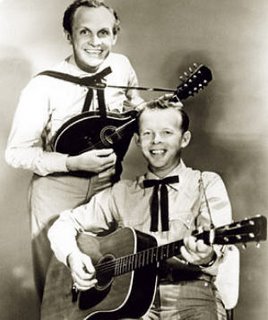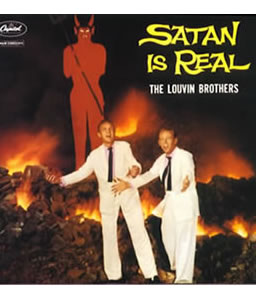
Subscribe to Dreamtime
[The Louvin Brothers - "When I Stop Dreaming" excerpt]
Gram Parsons paid friends to search for Louvin Brothers records. Elvis had advance copies of their records sent to him so he could give them to his mother. A young Johnny Cash waited by the side of the road to catch a glimpse of Ira and Charlie Louvin when they came through town.
The Louvin Brothers. "[They were] without limits," says Tom Wilmeth, author of Heaven's Own Harmony, a 1999 book on the Louvins. "They could perform songs that would send you to church, then break your heart with a tale of lost love."
Lonnie Ira Loudermilk and Charlie Loudermilk were born and raised in the Alabama Appalachian mountains. Ira, born in 1924, was three years older than Charlie. They started their careers singing gospel songs in church, and listening to close harmony country brother acts - the Blue Sky Boys, the Delmore Brothers, the Callahan Brothers, the Monroe Brothers - on the radio. Ira began playing mandolin, while Charlie learned the guitar, and the two began harmonizing like their favorite radio acts. The duo began performing publicly in 1940, earning three dollars for singing all day at a 4th of July hootenanny.
They began performing on an early-morning show at a radio station in Chattanooga, Tennessee, but then Charlie enlisted in the Army in the early '40s, and Ira played with Charlie Monroe while his brother was gone. After Charlie's Army stint, the brothers moved their career to Knoxville, TN, where they played the radio circuit. It was in Knoxville that the two changed their Loudermilk last name to the more memorable stage name of Louvin.
In 1949, the Louvins recorded a single for Decca that disappeared without a trace. Two years later they signed with MGM, recorded 12 songs, again without much commercial success. In the early `50s the brothers were reduced to working as postal clerks in Memphis, TN during the day while doing concerts and radio gigs at night. Finally, they'd get a break with Capitol, and record a single that would become a minor hit in 1952, the gospel song, "The Family That Prays Together."
Things were beginning to look up for the Louvins, but then Charlie was called back into the Army because of the Korean War. When Charlie was discharged this time around, the Louvins relocated to Birmingham AL, where they planned to restart their careers. But they had problems getting back on the radio, as another duo had already carved out a close-harmony niche on the Alabama airwaves, ironically using several songs of the Louvins' own. Things weren't looking good, until Capitol Records was able to get the Louvins a gig on the Grand Ole Opry.
Here's where the story get a little flakey. Some reports have it the Louvins began singing secular material as soon as they landed a slot on the show, primarily because a tobacco company sponsoring its broadcast told the Opry and the Louvins "you can' sell tobacco with gospel music." But Charlie Louvin, who should know, says that Capitol had the boys straight-jacketed into a contract that allowed them to only record sacred songs, with the same restrictions carried over to their Grand Ole Opry performances. "The record company had no idea what to do with us," says Charlie. "They thought our songs were too religious for the country crowd, and too country for the gospel fans."
The powers at Capitol finally told Ira and Charlie that they could release one secular single, but if it didn't become a hit, then Capitol would cancel their contract. They chose one of Ira's originals, "When I Stop Dreaming." And the song would chart to #8 on the Billboard charts in 1955.
And the Louvin Brothers' career was off. That first chart-topper was followed shortly afterward by "I Don't Believe You've Met My Baby," which spent two weeks at number one early in 1956. Three of the duo's other singles -- "Hoping That You're Hoping," "You're Running Wild," and "Cash on the Barrel Head" -- reached the Top Ten that year, particularly impressive when you consider that rock & roll was starting to take over the airwaves by the mid-50s, as Dylan mentions as an aside in the "Dogs" episode of "Theme Time."
 [Satan is Real excerpt]
[Satan is Real excerpt]
Part 2 - Satan is Real
And what about that album, "Satan is Real"?
[Dylan excerpt]
Ira Louvin designed the cover of what may be the Louvin Brothers' most famous album in 1958. If you took Dylan's advice and did a search through Yahoo or Google, you'd find a photograph of him and Charlie in matching white suits, pink shirts, and blue ties arms outstretched, before what looks like the pits of Hell. Behind their backs, standing in the flames is a gigantic red devil, complete with fangs, horns, and pitchfork.
"Ira built that set," said Charlie. "The devil was twelve feet tall, built out of plywood. We went to this rock quarry and then took old tires and soaked them in kerosene, got them to burn good. It had just started to sprinkle rain when we got that picture taken. Those rocks, when they get hot, they blow up. Pieces of rock up were going up into the air."
The brothers look pretty calm in the photo, considering they were being bombarded by burning rocks and almost burnt alive when the tire fire began to rage out-of-control.
The title track of "Satan Is Real" features a sermon by Ira, considering the proposition that if God exists, so must Satan.
[Ira preaching excerpt]
David Gates, who's written several articles about Dylan at various points in his career, reportedly was correcting a quote he was using from "Satan is Real," in the galleys of his novel, "Preston Falls," when Dylan called. During the course of the interview, Dylan started talking about religious songs, and remarked how frightening he felt the "Satan is Real" song was. "That's weird," Gates told him. "I'm looking at the lyrics right now." "It's a small world, Dave," Dylan said.
Part 3 - Out Past Where the Buses Run
"I think religion tortured Ira," Charlie once said. Ira had his demons, for sure, more dangerous than any plywood Satan. Ira was an alcoholic.
"Today they call it an illness," Charlie says. "In those days it was bein' mean." And Ira was about as mean as drunk as you would want to encounter. When Ira drank, he fought, as Dylan notes in this story he tells about Ira's encounter with Red Foley.
["An interesting story" - from "Dogs"]
And when Ira drank, he cheated on each of his four wives. Ira had three bullets near his spine-the work of his third wife, who had shot him five times in 1963, after Ira had tried to strangle her with a telephone cord.
And when Ira drank he was stupid-mean. He once succeeded in killing an opportunity to tour with a young Elvis Presley, already better known at the start of his career than Ira would ever be. Elvis was a devoted Louvins fan, until [Ira]* called him a "white nigger" and his rock 'n roll "trash."
As Dylan notes, Ira had finally "gone out past where the buses run."
Between declining sales and Ira's erratic temper, the Louvins decided to split up the act in 1963. Charlie went on to a long solo career, and remains a fixture at the Grand Ole Opry to this very day. In fact, you can email Charlie at his official web site…
Ira, as you could guess, didn't make it. He was with his fourth wife, Anne Young. performing a week of concerts in Kansas City in June of 19 and 65 when they were both killed in Williamsburg, MO, by a drunk driver.
Ira died with a warrant out for his arrest on his own DUI charges.
Drunk driving is the second-leading cause of death in the Louvin Brothers body of work, a fate exceeded only by murder.
Maybe Ira saw the writing on the wall.
["You're Running Wild" excerpt]
This has been Fred Bals with the Dreamtime podcast - occasional commentary on Bob Dylan's Theme Time Radio Hour weekly show. Dreamtime is not associated with XM Radio, Bob Dylan, or much of anything else. Until next week, don't stop dreaming.
*I misread the brother's name as "Charlie" in the podcast. It should be "Ira," of course - fhb
Sources: Satan is Real; Google Groups thread; CMT.com; Alabama Music Hall of Fame. Tom Wilmeth's liner notes from "Livin', Lovin' Losin': Songs of the Louvin Brothers. "Theme Time" excerpts from episodes 14 "Devil," and Episode 16 "Dogs."
SiteSearch Google
Monday, August 21, 2006
Episode 10 – Too religious for the country crowd, too country for gospel fans
Posted by
Fred@Dreamtime
at
1:39 PM
![]()
Labels: Devil, Grand Ole Opry, Louvin Brothers, Satan is Real


No comments:
Post a Comment